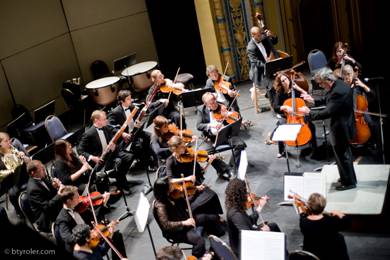The Western Piedmont Symphony presented the final concert of its regular chamber music series on Saturday, April 7th at the Episcopal Church of the Ascension in Hickory. The Degas String Quartet, making its first return to Hickory following completion of its three-year residency, was the featured ensemble. Joining original quartet members Simon Ertz, viola, and Philip von Maltzahn, cello, were violinists Timothy Peters and Naho Tsutsui.
The program was given as a benefit for the Greater Hickory Cooperative Christian Ministries, and the audience was asked to bring two or more cans of food as the price of admission.
The entire program was devoted to “The Seven Last Words of Our Saviour on the Cross” by Franz Josef Haydn (1732-1809). The work was written in 1786 on a commission from the canon of the Cathedral of Cádiz, Spain, to be performed on Good Friday of the next year. It consists of an introduction and seven solemn meditations, which were intended to serve as interludes between sermons built around the events of the Crucifixion.
Haydn originally wrote the “Seven Last Words” for a full orchestra, and at the same time he made an arrangement for string quartet. He also oversaw the publishing of a piano reduction the same year. Almost ten years later, he produced an oratorio version for chorus and orchestra. Thus, there now exist four different versions.
This performance, of course, was the one for string quartet. Between each section of the work, the biblical text corresponding to the title of each movement was read, followed by a short biblical meditation. The readers for the evening were Jim Roane, Suzanne Garrett, and John Gordon Ross.
Haydn’s score is a painstaking treatment of varying degrees of slowness: adagio, grave, largo and lento (slow, solemn, very slow, and slow). The final section, following the last work, is presto (very fast), and is a vivid musical depiction of the earthquake that is said to have followed the death of Christ.
The Degas Quartet portrayed all of the sections with pathos and solemnity suitable for the occasion. The last movement was played as if all hell had broken loose, which, indeed, is said to have been the case.
There is always concern when an established ensemble takes on new members. In this case, the fit seemed perfect. Their styles, sounds, and instruments blended well. Hopefully, this can become a permanent arrangement for the Degas Quartet. We look forward to a continuing relationship in the Hickory area with this fine ensemble.











